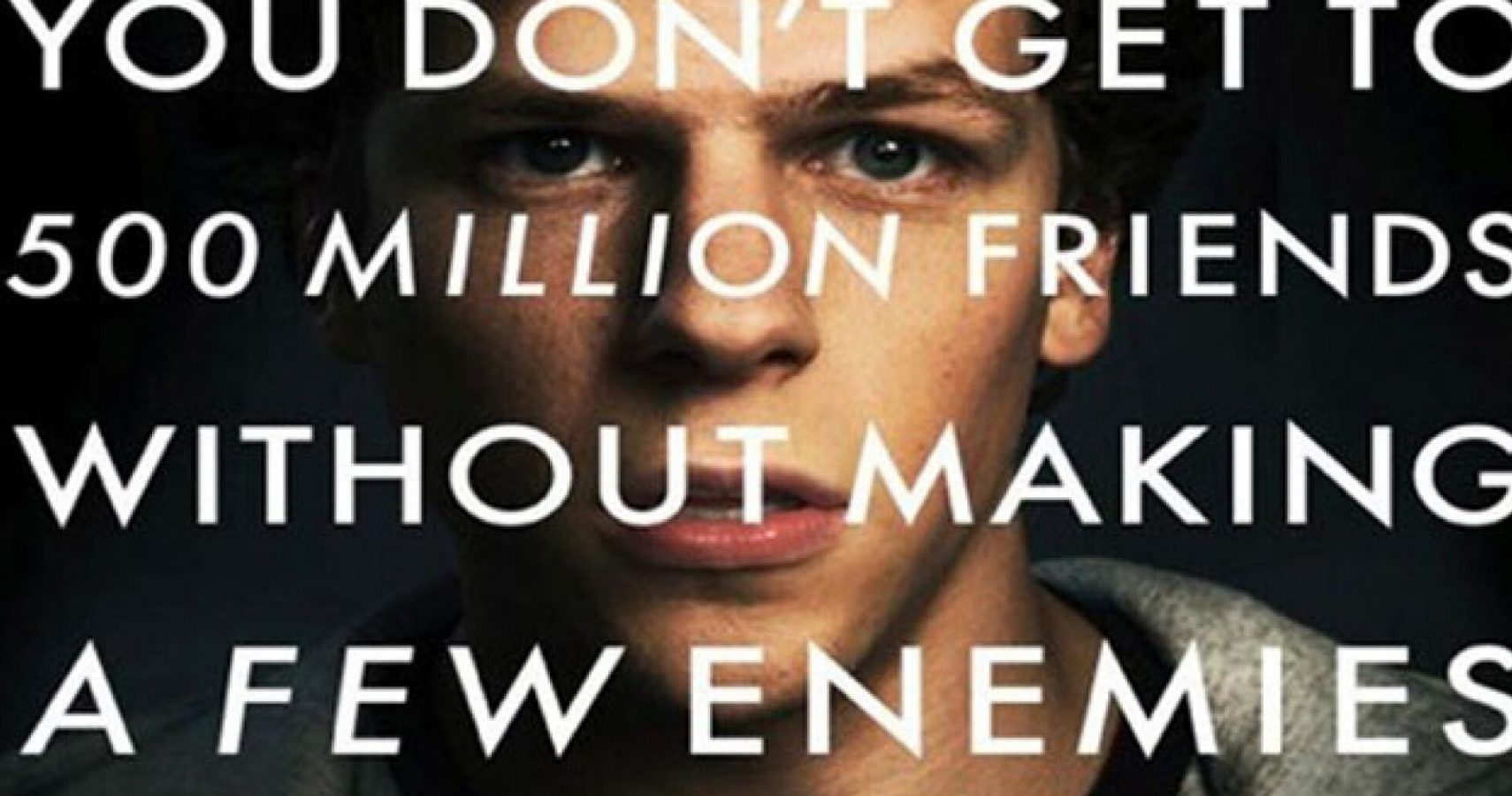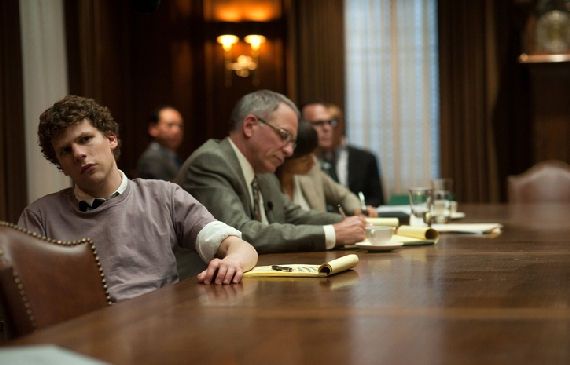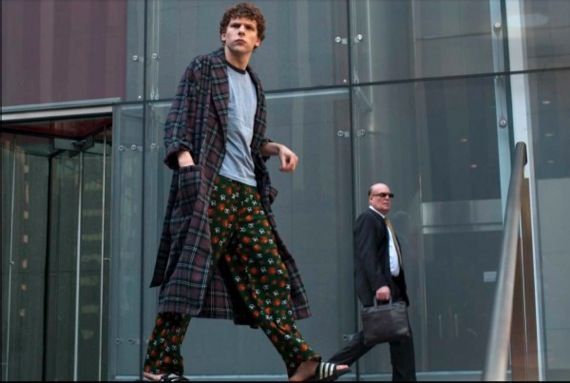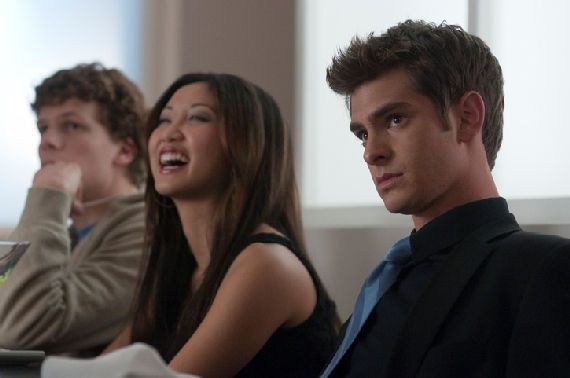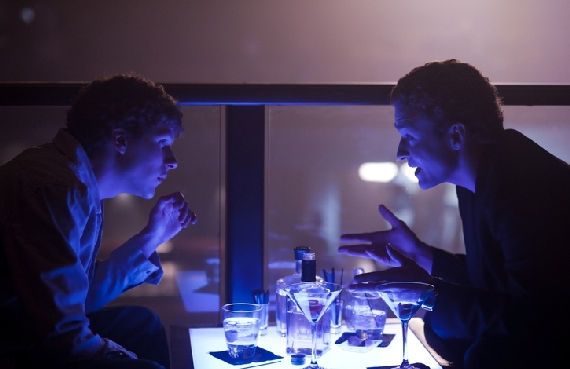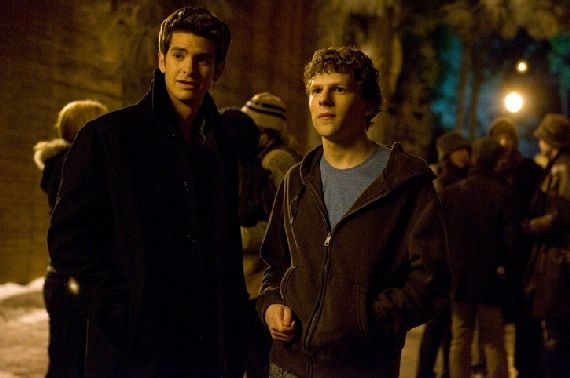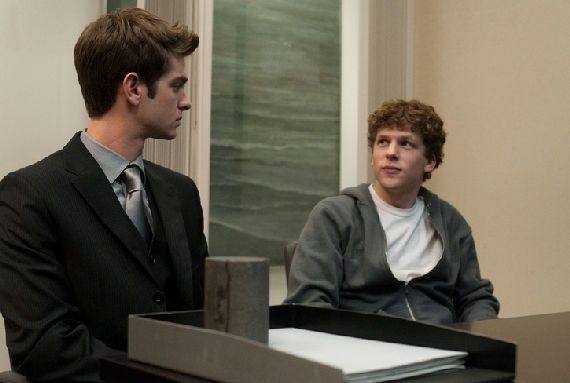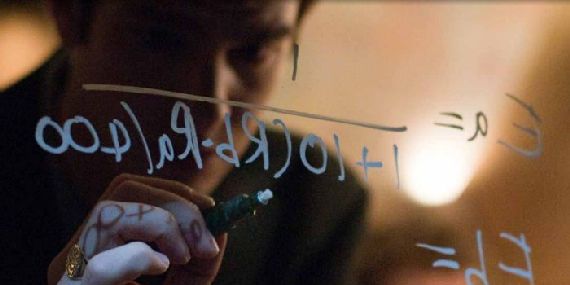Screen Rant's Kofi Outlaw Reviews The Social Network
Facebook is a social media giant that has indisputably changed the world, affecting everything from how people share their lives, to how people market, promote and sell businesses, products and even their own talents. In fact, Facebook is so prevalent in our modern digital age that it even has the power to change the topography of culture, pop-culture, art, politics, and in rare cases, even religion.
Given that Facebook is what it is today, I must admit that it's somewhat surprising that it has taken this long for a movie to be made about its origins. And while that movie, The Social Network, is an interesting and visually rich exploration of the events that led up to arguably the most influential invention of a generation, a lackluster ending and overall feeling of pointlessness mark it well short of being the film which defines a generation.
By now the basic story behind the invention of Facebook is pretty well known: In 2003, Harvard student Mark Zuckerberg (Jesse Eisenberg) came up with an idea: take the entire social experience of Harvard and turn it into a comprehensive website in a way that other sites like MySpace and Friendster had never envisioned. Along with two of his programmer pals, and his best friend Eduardo Saverin (Andrew Garfield) supplying the startup capital, Zuckerberg created "The Facebook," an early blueprint of what would eventually become the social networking Juggernaut we know today.
Of course with any rose of an idea come thorns, and Zuckerberg's meteoric rise to fame (and infamy) comes at the cost of multiple legal skirmishes and shattered personal relationships. Being at the forefront of a trend can be be a lonely experience.
There is a lot about The Social Network that is impressive. The film was directed by David Fincher, the man behind some great pieces of cinema such as Se7en, Fight Club, Zodiac, and the Oscar-nominated Curious Case of Benjamin Button. Fincher fans generally know and love the acclaimed director for his three main signatures: a perfectionist attitude, impeccable camerawork and his dark yet vividly-colored cinematography. All three of those Fincher signatures can be found in The Social Network, offering viewers a feast for the eye. The early scenes set in Harvard are by far the most gorgeous, taking the historic university and giving it an edgy, dark, rock video sheen. I'm fairly sure Harvard has never looked so cool.
Fincher (with help from his screenwriter, Aaron Sorkin) structures the film in way that's somewhat surprising, yet at the same time refreshing and clever. Most memoir films are pretty linear in form (beginning of the event, up until the thematic climax), however The Social Network takes another approach. At first it seems as though we're getting the standard beginning-to-end structure, but around the 20-30 minute mark the film suddenly begins to jump around in space and time, showing Zuckerberg caught up in the midst of various legal battles.
It's a bit jarring at first, until Fincher eases us into the realization that it's actually the conversations in these legal depositions that are driving the story. Lawyers ask questions, and the answers lead to flashbacks about Facebook's inception; what is revealed in those flashbacks lead to further legal questions which jump us yet again to one deposition or another, as Zuckerberg tries to defend "his creation" from various attackers. It sounds more confusing than it actually is; in the hands of a skilled orchestrator like Fincher, this unique structure works to the movie's benefit, adding a sense of movement to what could've been a boring film, otherwise.
The performances are pretty spectacular - especially those of the two leads, Eisenberg and Garfield. Eisenberg has been tagged in some circles as "the other Michael Cera," referring to the latter actor's penchant for playing the loveable nerd in virtually every role he takes on. This is not at all true for Eisenberg, who portrays Mark Zuckerberg as something of a tragically ironic figure: an acerbic genius who is totally clueless when it comes to human interaction; a guy who earns fortune and fame off a website dedicated to social circling, but has very few "real friends" to call his own.
Eisenberg flat-out steals just about every scene he's in, glaring at people around him like they are nitwits, while delivering scathing insights that could make a person feel that very way. A definite standout performance that is worthy of recognition (provided people don't find his character too unlikable).
Andrew Garfield is a fast-rising star: he's already been tapped as the new Spider-Man in Sony's reboot of that franchise, and he has another prestige picture, Never Let Me Go, due out this fall. Here, Garfield plays a near-perfect straight man foil to Eisenberg's eccentric genius. Eduardo Saverin is the type of smart kid who (ironically enough) prefers the actual social experience of college to sitting in dim-lit dorm rooms creating an online imitation of it. Garfield successfully builds Saverin into a three-dimensional character with a range of a emotions, a slightly naive kid caught up in a gold rush that is moving way too fast for him (or anyone) to keep ahead of.
The scenes of Saverin and Zuckerberg in their happy days at Harvard juxtapose well to the later days when they're ultimately sitting across the table from one another, talking through lawyers. The climatic scene of their falling out actually packs some emotional punch, which is a credit that goes directly to the talents of both young men.
Of course, I'd be remiss if I didn't mention Justin Timberlake as Sean Parker, the inventor of Napster who eventually partners with Zuckerberg to transform Facebook into the behemoth it is today. Timberlake manages to shed his celebrity image and slip into his role pretty well, portraying Parker as an extremely savvy businessman who is simultaneously chock full of B.S.. All in all, Timberlake continues to prove that he is not the joke of an actor some people may want to label him as.
Continue to the disappointing aspects of The Social Network...
I've discussed what impressed me about The Social Network, now I must address what disappointed me. That would be the script by Aaron Sorkin. Let me be clear: Sorkin's script tears out of the gate crackling with energy, good pacing and whip-smart dialogue. This a film with almost no physical action, and so the conversations between characters had to be totally engaging and amusing for The Social Network to have any traction at all. Sorkin rises to that challenge.
The problem (for me at least) is that the film starts with a bang but ends with a fizzle. The opening scene (a conversation between Zuckerberg and his ex-girlfriend, played by Rooney Mara) is one of the best I've seen since Quentin Tarantino's Inglorious Basterds, and instills confidence early on that "the Facebook movie" might be more dynamic and entertaining than expected. As I've said, the dialogue is sharp, crisp, hip and thoroughly entertaining, however it's the presence of a larger point to the story that seems to be missing from The Social Network.
Sure, the film has a point - only it's one that becomes all too obvious far too early, and is hammered on again and again throughout the film's final act, just in case anyone in the audience is too obtuse to get it. The themes of Sorkin's script are also pretty cliched: legal battles and lost friends are practically rites of passage in the rise to fame and fortune in America - we've seen this story many times before. By the time the big fallout between Zuckerberg and Saverin plays out, despite how well it's executed, I was left feeling somewhat underwhelmed.
To be honest, I believe Sorkin committed one of the greatest sins of storytelling: missing the opportunity to both look deeper and say something bigger. Part of what makes The Social Network's first third so engaging is that we get to see Zuckerberg actually interacting in the digital realm he is about to revolutionize. We hear entries from his Live Journal blog in voiceover, see him creating other, smaller, web projects and watch him squirming between a digital realm where he's a virtual god, and the real world where he's a hapless loser. For me, this opening act was the most interesting thing the film offered - a larger commentary about how we all navigate life and "reality" in a digital age where our online profiles, blogs and Tweets have begun to define us more than our flesh and blood actions can.
However, by the time the movie hits its midpoint, Sorkin's script loses a good deal of steam, settling into a standard narrative of wealth, fame, power, and the relationships fractured as a result. The script also strangely diverts its focus away from Zuckerberg and onto some of the secondary characters such as Saverin, Parker, or (oddly enough) a trio of Harvard students who also sue Zuckerberg over Facebook. Combined, the jumps between characters, times and places quickly wears the film's unique structure thin, and worse, made me start to wonder what the point was.
There's also one glaring problem with telling this story at all: the history of Mark Zuckerberg and Facebook is still being written. How can Sorkin fashion a story that feels complete when the person the story is about has not yet completed his arch? If Facebook's role in our lives is still evolving, what point is there to be made about its creation - that it cost Zuckerberg friends and gave him legal headaches? As I said, that's a cliched story, but more to the point: most people would argue that becoming a multi-billionaire in your twenties is worth it. For those people - who believe the rewards justify the struggle - The Social Network is going to have little insight to offer.
It's only in the closing minutes of the film that Sorkin's script returns to the intriguing theme offered by the opening act: how Zuckerberg's online persona coincides with his real-world experience. I think Sorkin and Fincher felt they were being deep and profound by closing things off that way; in my opinion, The Social Network might've truly been 'the film that defined a generation' had that question been explored at greater length. As it stands, this is pretty much the story about how a couple of Harvard kids got rich off of the Internet.
Watch the trailer for The Social Network to help you decide whether to see it in theaters:
[poll id="78"]

